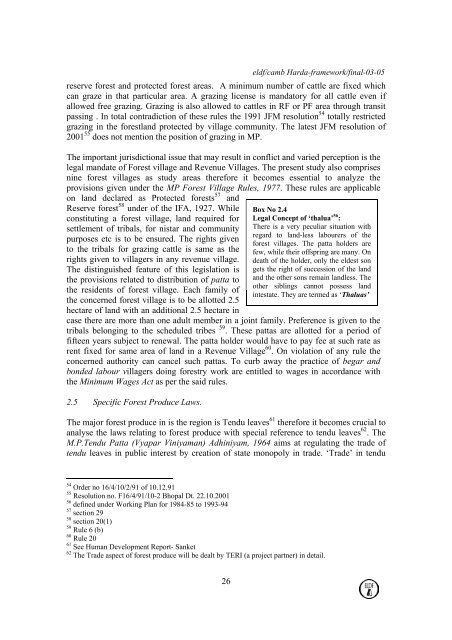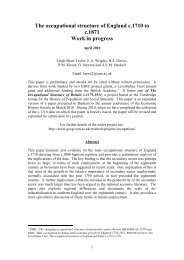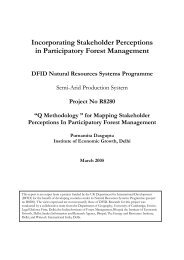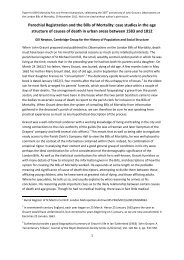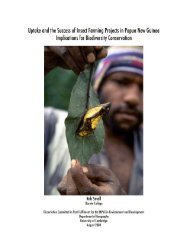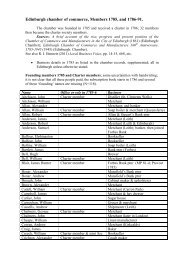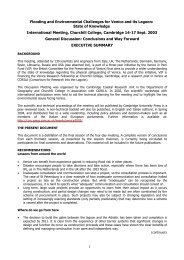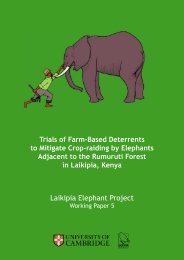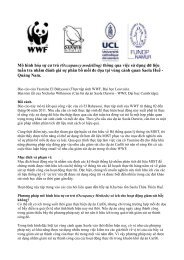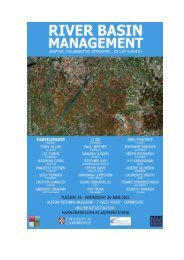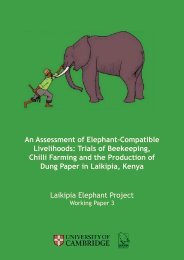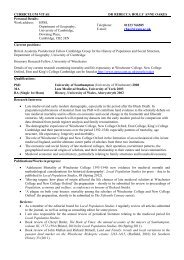Incorporating Stakeholder Perceptions in Participatory Forest
Incorporating Stakeholder Perceptions in Participatory Forest
Incorporating Stakeholder Perceptions in Participatory Forest
Create successful ePaper yourself
Turn your PDF publications into a flip-book with our unique Google optimized e-Paper software.
eldf/camb Harda-framework/f<strong>in</strong>al-03-05<br />
reserve forest and protected forest areas. A m<strong>in</strong>imum number of cattle are fixed which<br />
can graze <strong>in</strong> that particular area. A graz<strong>in</strong>g license is mandatory for all cattle even if<br />
allowed free graz<strong>in</strong>g. Graz<strong>in</strong>g is also allowed to cattles <strong>in</strong> RF or PF area through transit<br />
pass<strong>in</strong>g . In total contradiction of these rules the 1991 JFM resolution 54 totally restricted<br />
graz<strong>in</strong>g <strong>in</strong> the forestland protected by village community. The latest JFM resolution of<br />
2001 55 does not mention the position of graz<strong>in</strong>g <strong>in</strong> MP.<br />
The important jurisdictional issue that may result <strong>in</strong> conflict and varied perception is the<br />
legal mandate of <strong>Forest</strong> village and Revenue Villages. The present study also comprises<br />
n<strong>in</strong>e forest villages as study areas therefore it becomes essential to analyze the<br />
provisions given under the MP <strong>Forest</strong> Village Rules, 1977. These rules are applicable<br />
on land declared as Protected forests 57 and<br />
Reserve forest 58 under of the IFA, 1927. While<br />
constitut<strong>in</strong>g a forest village, land required for<br />
settlement of tribals, for nistar and community<br />
purposes etc is to be ensured. The rights given<br />
to the tribals for graz<strong>in</strong>g cattle is same as the<br />
rights given to villagers <strong>in</strong> any revenue village.<br />
The dist<strong>in</strong>guished feature of this legislation is<br />
the provisions related to distribution of patta to<br />
the residents of forest village. Each family of<br />
the concerned forest village is to be allotted 2.5<br />
hectare of land with an additional 2.5 hectare <strong>in</strong><br />
case there are more than one adult member <strong>in</strong> a jo<strong>in</strong>t family. Preference is given to the<br />
tribals belong<strong>in</strong>g to the scheduled tribes 59 . These pattas are allotted for a period of<br />
fifteen years subject to renewal. The patta holder would have to pay fee at such rate as<br />
rent fixed for same area of land <strong>in</strong> a Revenue Village 60 . On violation of any rule the<br />
concerned authority can cancel such pattas. To curb away the practice of begar and<br />
bonded labour villagers do<strong>in</strong>g forestry work are entitled to wages <strong>in</strong> accordance with<br />
the M<strong>in</strong>imum Wages Act as per the said rules.<br />
2.5 Specific <strong>Forest</strong> Produce Laws.<br />
Box No 2.4<br />
Legal Concept of ‘thalua’ 56 :<br />
There is a very peculiar situation with<br />
regard to land-less labourers of the<br />
forest villages. The patta holders are<br />
few, while their offspr<strong>in</strong>g are many. On<br />
death of the holder, only the eldest son<br />
gets the right of succession of the land<br />
and the other sons rema<strong>in</strong> landless. The<br />
other sibl<strong>in</strong>gs cannot possess land<br />
<strong>in</strong>testate. They are termed as ‘Thaluas’<br />
The major forest produce <strong>in</strong> is the region is Tendu leaves 61 therefore it becomes crucial to<br />
analyse the laws relat<strong>in</strong>g to forest produce with special reference to tendu leaves 62 . The<br />
M.P.Tendu Patta (Vyapar V<strong>in</strong>iyaman) Adh<strong>in</strong>iyam, 1964 aims at regulat<strong>in</strong>g the trade of<br />
tendu leaves <strong>in</strong> public <strong>in</strong>terest by creation of state monopoly <strong>in</strong> trade. ‘Trade’ <strong>in</strong> tendu<br />
54 Order no 16/4/10/2/91 of 10.12.91<br />
55 Resolution no. F16/4/91/10-2 Bhopal Dt. 22.10.2001<br />
56 def<strong>in</strong>ed under Work<strong>in</strong>g Plan for 1984-85 to 1993-94<br />
57 section 29<br />
58 section 20(1)<br />
59 Rule 6 (b)<br />
60 Rule 20<br />
61 See Human Development Report- Sanket<br />
62 The Trade aspect of forest produce will be dealt by TERI (a project partner) <strong>in</strong> detail.<br />
26


